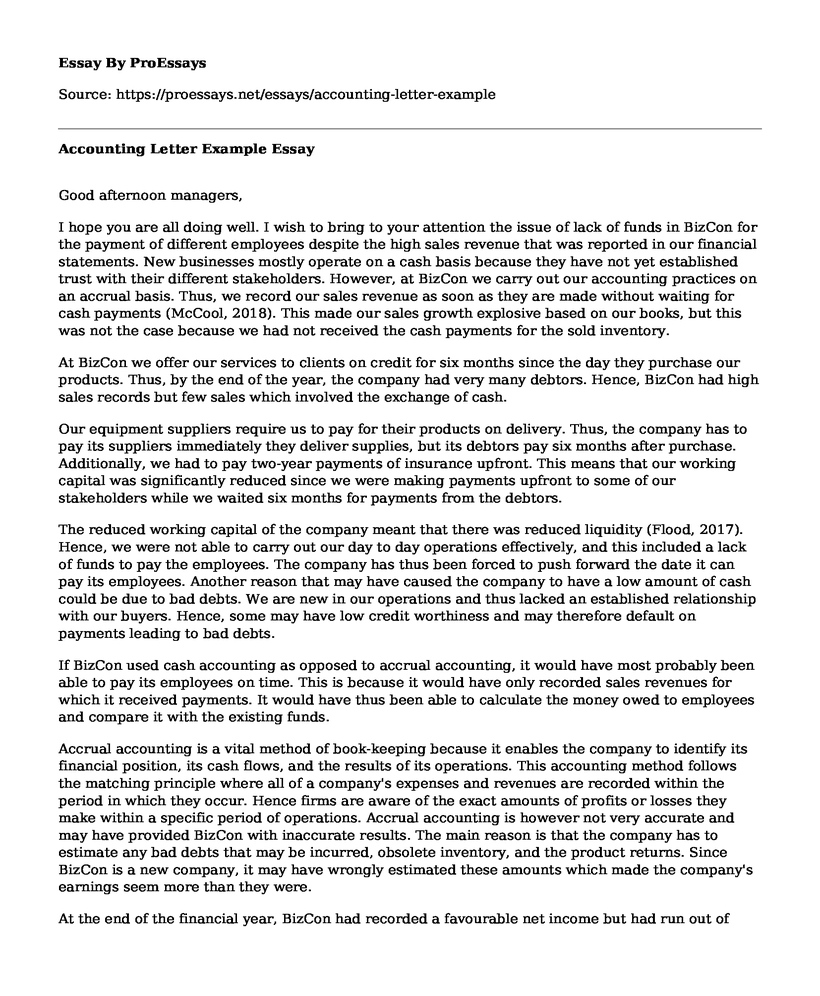I hope you are all doing well. I wish to bring to your attention the issue of lack of funds in BizCon for the payment of different employees despite the high sales revenue that was reported in our financial statements. New businesses mostly operate on a cash basis because they have not yet established trust with their different stakeholders. However, at BizCon we carry out our accounting practices on an accrual basis. Thus, we record our sales revenue as soon as they are made without waiting for cash payments (McCool, 2018). This made our sales growth explosive based on our books, but this was not the case because we had not received the cash payments for the sold inventory.
At BizCon we offer our services to clients on credit for six months since the day they purchase our products. Thus, by the end of the year, the company had very many debtors. Hence, BizCon had high sales records but few sales which involved the exchange of cash.
Our equipment suppliers require us to pay for their products on delivery. Thus, the company has to pay its suppliers immediately they deliver supplies, but its debtors pay six months after purchase. Additionally, we had to pay two-year payments of insurance upfront. This means that our working capital was significantly reduced since we were making payments upfront to some of our stakeholders while we waited six months for payments from the debtors.
The reduced working capital of the company meant that there was reduced liquidity (Flood, 2017). Hence, we were not able to carry out our day to day operations effectively, and this included a lack of funds to pay the employees. The company has thus been forced to push forward the date it can pay its employees. Another reason that may have caused the company to have a low amount of cash could be due to bad debts. We are new in our operations and thus lacked an established relationship with our buyers. Hence, some may have low credit worthiness and may therefore default on payments leading to bad debts.
If BizCon used cash accounting as opposed to accrual accounting, it would have most probably been able to pay its employees on time. This is because it would have only recorded sales revenues for which it received payments. It would have thus been able to calculate the money owed to employees and compare it with the existing funds.
Accrual accounting is a vital method of book-keeping because it enables the company to identify its financial position, its cash flows, and the results of its operations. This accounting method follows the matching principle where all of a company's expenses and revenues are recorded within the period in which they occur. Hence firms are aware of the exact amounts of profits or losses they make within a specific period of operations. Accrual accounting is however not very accurate and may have provided BizCon with inaccurate results. The main reason is that the company has to estimate any bad debts that may be incurred, obsolete inventory, and the product returns. Since BizCon is a new company, it may have wrongly estimated these amounts which made the company's earnings seem more than they were.
At the end of the financial year, BizCon had recorded a favourable net income but had run out of cash because due to its accrual accounting method, its financial statements contained revenues that had not been paid yet. This means that the earnings were only recorded on paper.
To prevent such an occurrence in the future, BizCon can first minimize the period of payment for goods and services by its debtors to one month. Additionally, the company can negotiate with its suppliers to provide it with a one-month period to pay for the supplies. Moreover, since BizCon is a young company, it can use the cash basis in its book-keeping practices to enable it to balance its working capital with its employed capital to ensure that it always has disposable cash for different needs.
Signature
Title
Contact info
References
Flood, J. (2017). Wiley GAAP 2017 - Interpretation and Application of Generally Accepted Accounting Principles. Wiley Online Library.
McCool, C. (2018). Cash Basis vs. Accrual Accounting.
Cite this page
Accounting Letter Example. (2022, Mar 29). Retrieved from https://proessays.net/essays/accounting-letter-example
If you are the original author of this essay and no longer wish to have it published on the ProEssays website, please click below to request its removal:
- Evaluating Return on Investment Paper Example
- Auditing-Internal Control - Essay Sample
- Essay Example on Fixed Exchange Rate: Devaluation/Revaluation of Currency
- Essay on 3 Best Accounting Softwares for Small Business: QuickBooks, FreshBooks & Wave
- Forensic Accounting Investigation of Proposed Merger - Essay Sample
- Paper Sample on Maximizing Revenue Cycle Performance: A Critical Factor for Hospitals
- Report Example on International Business: Intangible Assets & Cost







